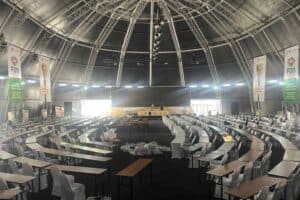Although there is no proof to show incidents were connected, there had been a number of discussions about a possible link between what was happening politically and the sudden attacks on prominent buildings.

Following a break-in at the City of Joburg’s offices in Braamfontein on Sunday, experts say the growing number of attacks and cases of theft and arson on national buildings might be more than just casual incidents, but have some sort of political intent.
According to the Institute for Security Studies policing researcher Dr Johan Burger, although they did not have enough proof to show these incidents were connected, there had been a number of discussions about a
possible link between what was happening politically and the sudden prevalence of attacks on prominent buildings.
“But we don’t have enough information to conclude this is indeed happening. It is, however, a possibility. I would not completely neglect that there is a possibility,” Burger said.
“It’s quite possible, but without sufficient proof we cannot conclusively say that it is the case.”
He said the attacks, such as the parliamentary fire, another fire at the art gallery at the Enoch Mgijima local municipality, the Air Force Base Waterkloof fire, unauthorised access to the Musanda headquarters of the State Security Agency and the 158 firearms stolen from the Norwood police station were worrying.
ALSO READ: Poor service delivery at the core of July unrest
“It is something we need to keep a close eye on and see where it is going, but it’s very concerning that it is indeed happening; that there is some sort of subversive element behind this,” he said.
“Although it is simply a suspicion, there may be more to it than just a casual break-in or setting fire to a building.”
However, criminologist Dr Guy Lamb said while it is difficult to conclude the attacks on national buildings were connected, there seemed to be a coordination or orchestration behind the planning of certain incidents.
“There are a lot of question marks about all these incidents, especially since the July riots. There may be more to these cases, as investigation are still underway It is setting a trend that others are following,” he said.
“It’s very difficult to tell but certainly it’s around a pattern that is working. It is difficult to see if this was unconnected individuals but a pattern has started and there are copy cats or some form of instigation behind it.”
ALSO READ: Internal ANC problems a matter of national security – July riots report
Lamb also said the background to most of these cases was the security, which had slipped since lockdown and Covid, which has seen the nature of patrols, access control and the quality of those processes decline.
Political economy analyst Daniel Silke said the problem was that the cases that have been in the limelight have had very little resolution, including the July unrest; there has been very little investigation and knowledge as to why it happened.
“And, how weak the police force was in preventing that kind of incident in an atmosphere where we have not had any proper accountability within the broader security cluster,” he said.
“Where we have not seen certain heads roll – be it in the police or other branches of the security cluster – we have a continuation of a very weak police force that cannot secure key points or critical buildings.”
Support Local Journalism
Add The Citizen as a Preferred Source on Google and follow us on Google News to see more of our trusted reporting in Google News and Top Stories.






